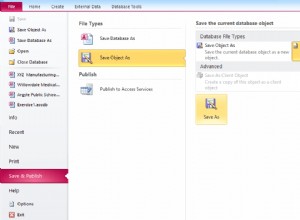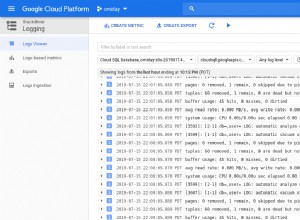Voici ce que j'ai fait pour contourner ce problème. Ce n'est pas joli, mais ça marche.
J'ai ajouté une méthode dans ma classe implémentant SQLData qui reçoit un java.sql.Connection et configure le java.sql.ARRAY correspondant objets.
Quelque chose comme ça :
public class MyObject01 implements SQLData {
private String value;
private MyObject02[] details; // do note that details is a java array
// ... also added getters and setters for these two properties
private Array detailsArray;
public void setupArrays(oracle.jdbc.OracleConnection oconn)
throws SQLException
{
detailsArrays = oconn.createARRAY(MyObject02.ORACLE_OBJECT_ARRAY_NAME, getDetails());
// MyObject02.ORACLE_OBJECT_ARRAY_NAME must be the name of the oracle "table of" type name
// Also note that in Oracle you can't use JDBC's default createArray
// since it's not supported. That's why you need to get a OracleConnection
// instance here.
}
@Override
public void writeSQL(Stream stream) throws SQLException {
stream.writeString(getValue());
stream.writeArray(detailsArray); // that's it
}
@Override
public void readSQL(Stream stream) throws SQLException {
setValue(stream.readString());
Array array = stream.readArray();
if (array != null) {
setDetails((MyObject02[])array.getArray());
}
}
C'est la première partie.
Ensuite, AVANT d'utiliser cet objet dans un appel de procédure, invoquez setupArrays méthode sur cet objet. Exemple :
public class DB {
public static String executeProc(Connection conn, MyObject01 obj)
throws SQLException
{
CalllableStatement cs = conn.prepareCall(" { ? = call sch.proc(?) }");
cs.registerOutParameter(1, Types.VARCHAR);
obj.setupArrays((oracle.jdbc.Connection)conn);
cs.setObject(2, obj, Types.STRUCT);
cs.executeUpdate();
String ret = cs.getString(1);
cs.close();
return ret;
}
}
Bien entendu, lors de la connexion, vous devez bien enregistrer vos types :
Connection conn = DriverManager.getConnection("jdbc:oracle://localhost:1521/XE", "scott", "tiger" );
conn.getTypeMap().put(MyObject01.ORACLE_OBJECT_NAME, MyObject01.class);
conn.getTypeMap().put(MyObject02.ORACLE_OBJECT_NAME, MyObject02.class);
conn.getTypeMap().put(MyObject02.ORACLE_OBJECT_ARRAY_NAME, MyObject02[].class);
J'espère que ça aide.




